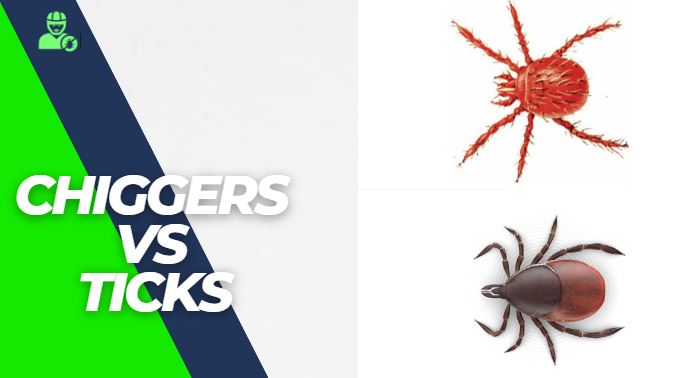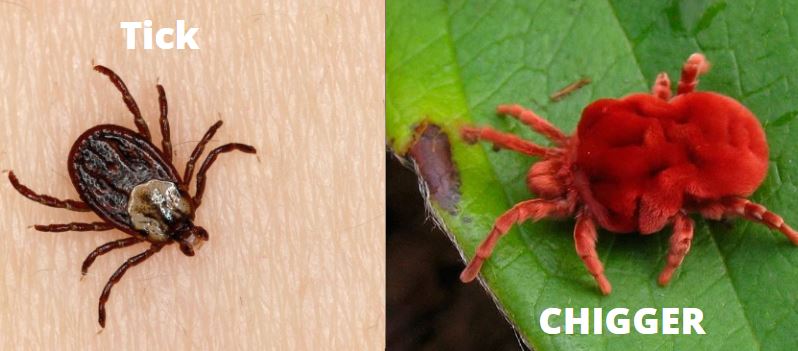


Chiggers vs Ticks
1. Chiggers
Chiggers are small, red bugs that are often mistaken for ticks. They can be found throughout the United States, including the Midwest, South, and Southwest.
During warm weather, chiggers are the most active. You might not be able to tell if you’ve been bitten until it’s too late, if you’ve been bitten by an insect.
1. Ticks
A tick requires blood for its development. The number of legs and body regions is what distinguishes adult ticks from insects.
Adult insects have 6 legs and 3 major body regions, while adult ticks have 8 legs and 2 major body regions.
Related: Are There Chiggers in Florida?
Related: Chiggers in Texas!
!2. Chigger Habitation!
Chiggers have six pairs of legs that they use to move around and three pairs of antennae to find food. Chiggers are not bugs; they are related to ticks.
The chigger lays her eggs in the soil, and the eggs hatch from the soil, making their way into the skin of a host.
Chiggers cause itching, redness, swelling, and sometimes burning, as they feed on the skin.
A rash can be caused by chiggers. They bite you and inject saliva that makes you itch. If you see a lot of chiggers, you should call your local pest control service. You can use a spray, but make sure you read the label.
2. Tick Habitation!
The small arachnids are usually about the size of a pinhead. They have a long, soft, hair-like body and two pairs of legs. The head, thorax, abdomen and legs are part of the tick’s body.
They are present in both the fall and winter months, but are more active during the warmer months. There are a number of ways to identify a tick like wooden or grassy areas and their habitat are deer, rabbits mouse and other rodents
The presence of ticks can be checked by using a mirror. A sore on your skin is a sign that you may have bumps. If you find a tick, take a pair of tweezers or a needle and gently remove it.
3. Chiggers Bite Health Risks
Chigger bites are annoying and can be uncomfortable. You can use antihistamines for relief.
If you have an allergy to chiggers, you may be able to get a prescription for an antihistamine.
3. Tick Bite Health Risks

image credits: Everydayhealth.com
Ticks can transmit diseases such as Lyme disease, which is transmitted through the bite of an infected tick. The disease is usually not contagious until the tick has been attached for several hours.
Ticks are often painless at first. But if you don’t check your pet for ticks, you could be at risk of getting a disease.
If you need help identifying a tick, contact your local health department or county extension office for assistance.
4. Symptoms of chiggers bites!
A chiggers bite can cause a rash on the skin. Bite can be confused with sting because they are both characterized by pain and redness. A sting can be distinguished from a bite by location.
While insects have a mouth full of sharp teeth that can puncture through the skin, most sting are caused by a stingray.
People don’t realize that chiggers can cause problems. Chiggers are not bugs. These insects live on the skin. Chiggers are about the size of a sesame seed and covered with a body part.
They are usually found in a puddle or in a damp area. The sesame seed is covered with a chitinous exoskeleton and it’s small.
The chiggers are not insects. They have no sense of smell. They are related to spiders and scorpions.
4. Symptoms of Tick bites!
A bull’s eye rash is usually caused by a tick bite. If you’re bitten by a tick, which releases a toxin, This causes a skin reaction.
You feel a rash coming on. It may be accompanied by fever, headache, nausea, and fatigue.
Lyme disease is caused by a tick-borne bacteria called Borrelia burgdorferi. It is transmitted to humans when a tick bites them and the bacteria enters the bloodstream.
Bacteria enter the body through a cut or break in the skin. Symptoms include fever, headache, fatigue, muscle aches, and swollen joints.
5. How to Avoid Chigger Bites?
5. How to avoid Tick bites?
6. Final Thoughts
Chiggers are small, red bugs that can cause irritation. You might not be able to tell if you’ve been bitten until it’s too late.
Adult ticks have more legs and body regions than adult insects. They also don’t lay eggs, so they don’t produce any offspring. Ticks will bite you because they’re looking for a blood meal.
It may take some time for you to see any results, especially if you don’t see the tick attached to your skin.
How to Get Rid of Ticks and Chiggers? Fast Method!
To get rid of ticks and chiggers, you can use organic pesticides.
Diamaceous earth is the most popular pesticide, killing both of them effectively.
What The Difference Between Tick and Chigger Bites?
Chigger bites:
are uncomfortable, itchy, annoying, and can make it difficult to sleep. In most cases, chigger bites don’t cause any harm to your health
Tick Bites:
When you are bitten by a tick, your tissue is pierced, anticoagulant saliva is injected, and your blood is sucked away.
How Do Chiggers and Ticks Look Like! Are Chiggers Like Ticks?

As you can see in this image, both of these are different.
I Hope This Guide Will Serve as A Quick Reference. if You Like This Article Hit the Newsletter/subscribe Button to See Our New Posts About and Share It with Your Friends, Also Gives Back Your Feedback if You Like or Dislike Anything in The Comments Section.
Thank You.
Please let me know I miss anything Or Maybe I didn’t mention!
How long will the ticks stay on your body after you initially contacted them and they started to bite me.I have hundreds of bites from my ankles to my neck,please respond to let me know what you think thank you Anthony
A tick can stay for a maximum of 10 days and minimum 3 to 4 days, depending on the situation.
I’m sorry to hear you have hundreds of bites on your ankles! Immediately wash with pesticide or go to the doctor for a checkup!